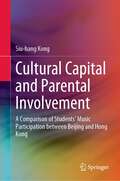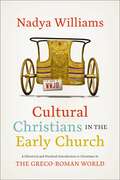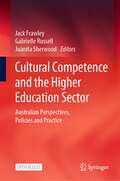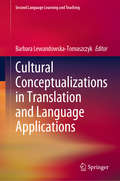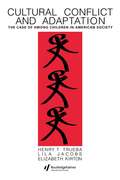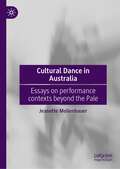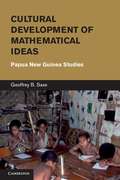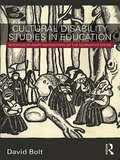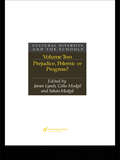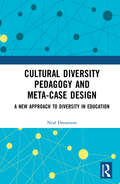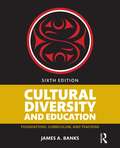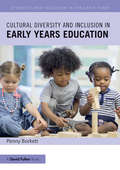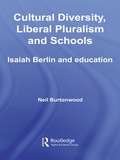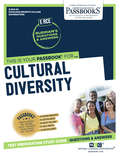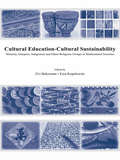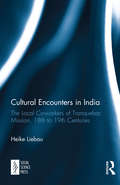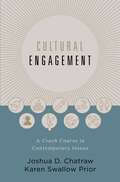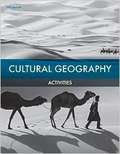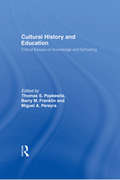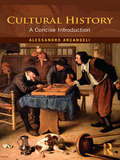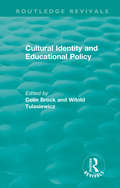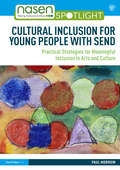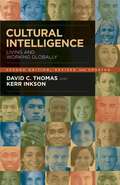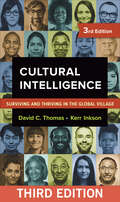- Table View
- List View
Cultural Capital and Parental Involvement: A Comparison of Students’ Music Participation between Beijing and Hong Kong
by Siu-hang KongThis book uses Pierre Bourdieu’s cultural capital model as a theoretical framework for exploring how students in Beijing and Hong Kong perceive parental influences—their parents’ cultural capital and support—on their participation in musical activities. By studying students’ perceptions of their parents’ cultural capital and support for their musical activities, this book revisits the applicability of Bourdieu’s cultural capital model in the contemporary Chinese context and reveals how inequality in terms of parental cultural capital governs parents’ support and influences the intergenerational transmission of cultural capital, which in turn contributes to inequality in terms of students’ cultural capital.
Cultural Christians in the Early Church: A Historical and Practical Introduction to Christians in the Greco-Roman World
by Nadya WilliamsIn the middle of the third century CE, one North African bishop wrote a treatise for the women of his church, exhorting them to resist such culturally normalized yet immodest behaviors in their cosmopolitan Roman city as mixed public bathing in the nude, and wearing excessive amounts of jewelry and makeup. The treatise appears even more striking, once we realize that the scandalous virgins to whom it was addressed were single women who had dedicated their virginity to Christ.Stories like this one challenge the general assumption among Christians today that the earliest Christians were zealous converts who were much more counterculturally devoted to their faith than typical church-goers today. Too often Christians today think of cultural Christianity as a modern concept, and one most likely to occur in areas where Christianity is the majority culture, such as the American "Bible Belt." The story that this book presents, refutes both of these assumptions.Cultural Christians in the Early Church, which aims to be both historical and practical, argues that cultural Christians were the rule, rather than the exception, in the early church. Using different categories of sins as its organizing principle, the book considers the challenge of culture to the earliest converts to Christianity, as they struggled to live on mission in the Greco-Roman cultural milieu of the Roman Empire. These believers blurred and pushed the boundaries of what it meant to be a saint or sinner from the first to the fifth centuries CE, and their stories provide the opportunity to get to know the regular people in the early churches. At the same time, their stories provide a fresh perspective for considering the difficult timeless questions that stubbornly persist in our own world and churches: when is it a sin to eat or not eat a particular food? Are women inherently more sinful than men? And why is Christian nationalism a problem and, at times, a sin? Ultimately, recognizing that cultural sins were always a part of the story of the church and its people is a message that is both a source of comfort and a call to action in our pursuit of sanctification today.
Cultural Competence and the Higher Education Sector: Australian Perspectives, Policies and Practice
by Jack Frawley Gabrielle Russell Juanita SherwoodThis open access book explores cultural competence in the higher education sector from multi-disciplinary and inter-disciplinary perspectives. It addresses cultural competence in terms of leadership and the role of the higher education sector in cultural competence policy and practice. Drawing on lessons learned, current research and emerging evidence, the book examines various innovative approaches and strategies that incorporate Indigenous knowledge and practices into the development and implementation of cultural competence, and considers the most effective approaches for supporting cultural competence in the higher education sector. This book will appeal to researchers, scholars, policy-makers, practitioners and general readers interested in cultural competence policy and practice.
Cultural Conceptualizations in Translation and Language Applications (Second Language Learning and Teaching)
by Barbara Lewandowska-TomaszczykThe book comprises a selection of 14 papers concerning the general theme of cultural conceptualizations in communication and translation, as well as in various applications of language.Ten papers in first part Translation and Culture cover the topics of a cognitive approach to conceptualizations of Source Language – versus Target Language – texts in translation, derived from general language, media texts, and literature.The second part Applied Cultural Models comprises four papers discussing cultural conceptualizations of language in the educational context, particularly of Foreign Language Teaching, in online communication and communication in deaf communities.
Cultural Conflict & Adaptation: The Case Of Hmong Children In American Society (Routledge Library Editions: Immigration And Migration Ser. #7)
by Henry T. Trueba Lila Jacobs Elizabeth KirtonFirst published in 1990. Routledge is an imprint of Taylor & Francis, an informa company.
Cultural Dance in Australia: Essays on performance contexts beyond the Pale
by Jeanette MollenhauerThis book draws on theories of aesthetics, post-colonialism, multiculturalism and transnationalism to explore salient aspects of perpetuating traditional dance customs in diaspora. It is the first book to present a broad-ranging analysis of cultural dance in Australia. Topics include adaptation of dance customs within a post-migration context, multicultural festivals, prominent performers, historiographies and archives, and the relative positionings of cultural and Western theatrical dance genres. The book offers a decolonized appraisal of dance in Australia, critiquing past and present praxes and offering suggestions for the future. Overall, it underscores the highly variegated nature of the Australian dance landscape and advocates for greater recognition of amateur community dance practices. Cultural Dance in Australia makes a substantial contribution to the catalogue of work about immigrants and cultural dance styles that continue to be preserved in Australia. This book will be of interest to scholars of dance, performance studies, migration studies and transnationalism.
Cultural Development of Mathematical Ideas
by Geoffrey B. Saxe Indigo EsmondeDrawing upon field studies conducted in 1978, 1980, and 2001 with the Oksapmin, a remote Papua New Guinea group, Geoffrey B. Saxe traces the emergence of new forms of numerical representations and ideas in the social history of the community. In traditional life, the Oksapmin used a counting system that makes use of twenty-seven parts of the body; there is no evidence that the group used arithmetic in prehistory. As practices of economic exchange and schooling have shifted, children and adults unwittingly reproduced and altered the system in order to solve new kinds of numerical and arithmetical problems, a process that has led to new forms of collective representations in the community. While Dr. Saxe's focus is on the Oksapmin, the insights and general framework he provides are useful for understanding shifting representational forms and emerging cognitive functions in any human community.
Cultural Disability Studies in Education: Interdisciplinary Navigations of the Normative Divide (Routledge Advances in Disability Studies)
by David BoltOver the last few decades disability studies has emerged not only as a discipline in itself but also as a catalyst for cultural disability studies and Disability Studies in Education. In this book the three areas become united in a new field that recognises education as a discourse between tutors and students who explore representations of disability on the levels of everything from academic disciplines and knowledge to language and theory; from received understandings and social attitudes to narrative and characterisation. Moving from late nineteenth to early twenty-first-century representations, this book combines disability studies with aesthetics, film studies, Holocaust studies, gender studies, happiness studies, popular music studies, humour studies, and media studies. In so doing it encourages discussion around representations of disability in drama, novels, films, autobiography, short stories, music videos, sitcoms, and advertising campaigns. Discussions are underpinned by the tripartite model of disability and so disrupt one-dimensional representations. Cultural Disability Studies in Education encourages educators and students to engage with disability as an isolating, hurtful, and joyful experience that merits multiple levels of representation and offers true potential for a non-normative social aesthetic. It will be required reading for all scholars and students of disability studies, cultural disability studies, Disability Studies in Education, sociology, and cultural studies.
Cultural Diversity And The Schools: Volume 2: Prejudice, Polemic Or Progress? (Cultural Diversity And The Schools Ser. #Vol. 3)
by James Lynch Sohan Modgil Celia ModgilFirst published in 1992. Routledge is an imprint of Taylor & Francis, an informa company.
Cultural Diversity Pedagogy and Meta-Case Design: A New Approach to Diversity in Education
by Neal DreamsonResponding to the growing need for educators to have a deeper understanding of cultural diversity, this book provides a theoretically-rich and empirically-sound analysis of diversity education, to develop a new cultural diversity pedagogy. The author deconstructs and navigates the complex field of diversity education, arguing for a more socially engaged approach, in which educators and researchers develop their perspectives on cultural diversity by examining their own assumptions, values, and beliefs. This is explored through a series of 10 case studies based in primary school settings demonstrating that teaching and learning environments are crucial to the success of cultural diversity.
Cultural Diversity and Education: Foundations, Curriculum, and Teaching
by James A. BanksNow available in paperback, the sixth edition of this definitive text provides students a strong background in the conceptual, theoretical, and philosophical issues in multicultural education from a leading authority and scholarly leader of the field---James A. Banks. In the opening chapter author Banks presents his well-known and widely used concept of Dimensions of Multicultural Education to help build an understanding of how the various components of multicultural education are interrelated. He then provides an overview on preparing students to function as effective citizens in a global world; discusses the dimensions, history, and goals of multicultural education; presents the conceptual, philosophical, and research issues related to education and diversity; examines the issues involved in curriculum and teaching; looks at gender equity, disability, giftedness, and language diversity; and focuses on intergroup relations and principles for teaching and learning. This new edition incorporates new concepts, theories, research, and developments in the field of multicultural education and features: A new Chapter 5, "Increasing Student Academic Achievement: Paradigms and Explanations" provides important explanations for the achievement gap and suggests ways that educators can work to close it. A new Chapter 7, "Researching Race, Culture, and Difference," explains the unique characteristics of multicultural research and how it differs from mainstream research in education and social science. A new Chapter 14, "Principles for Teaching and Learning in a Multicultural Society" contains research-based guidelines for reforming teaching and the school in order to increase the academic achievement and social development of students from diverse racial, ethnic, cultural, language, and gender groups. A new Appendix--"Essential Principles Checklist"--designed to help educators determine the extent to which practices within their schools, colleges, and universities are consistent with the research-based findings described in the book.
Cultural Diversity and Inclusion in Early Years Education (Diversity and Inclusion in the Early Years)
by Penny BorkettCultural Diversity and Inclusion in Early Years Education reveals how cultural diversity can be celebrated in every early years setting. Acknowledging the impact of culture on a child’s development and identity, the book demonstrates the need for practitioners to appreciate cultural difference, value diversity and ensure inclusive practices. Alongside comprehensive discussion of current and historical policy relating to multiculturalism and relevant sociocultural theory, the book provides practical guidance and resources to support practitioners in responding to the challenges of working with families and children from diverse cultural backgrounds. Chapters focus on topics such as: policy and the role of the practitioner sociocultural theories relating to child development building working relationships with families the impact of culture on a child's identity enabling environments and inclusive strategies. Including case studies, reflective questions and suggestions for further reading and research, this essential book will help early years practitioners and students to embrace the varied cultural heritages of the children in their care.
Cultural Diversity, Liberal Pluralism and Schools: Isaiah Berlin and Education (Routledge International Studies in the Philosophy of Education #Vol. 17)
by Neil BurtonwoodWith debates on the relationship between cultural diversity and the role of schools raging on both sides of the Atlantic, the time is apt for a philosophical work that shines new light on the issues involved and that brings a fresh perspective to a political and emotive discussion. Here Burtonwood brings the writing of British philosopher Isaiah Berlin to bear on the subject of multiculturalism in schools, the first time that his work has been applied to matters of education. Tackling the often-contradictory issues surrounding liberal pluralism, this book poses serious questions for the education system in the US and in the UK.
Cultural Diversity: Passbooks Study Guide (Excelsior/Regents College Examination Series)
by National Learning CorporationThe Excelsior/Regents College Examinations (E/RCE) offer you an opportunity to obtain recognition for college-level learning and consists of exams designed to demonstrate achievement and mastery of various college-level subjects, such as the Arts and Sciences, Business, Criminal Justice, Education, Health and Nursing. The E/RCE Cultural Diversity Passbook® prepares you by sharpening knowledge of the skills and concepts necessary to succeed on the upcoming exam and the college courses that follow. It provides a series of informational texts as well as hundreds of questions and answers in the areas that will likely be covered on your upcoming exam.
Cultural Education - Cultural Sustainability: Minority, Diaspora, Indigenous and Ethno-Religious Groups in Multicultural Societies
by Zvi Bekerman Ezra KopelowitzThis volume is a path-breaking contribution to the study of efforts of diaspora, indigenous, and minority groups, broadly defined, to use education (formal and informal) to sustain cultural continuity while grappling with the influences and demands of wider globalizing, nationalizing, or other homogenizing and assimilatory forces. Particular attention is given to groups that use educational elements other than second-language teaching alone in programs to sustain their particular cultural traditions. The focus of the book on cultural sustainability changes the nature of questions posed in multicultural education from those that address the opening of boundaries to issues of preserving boundaries in an open yet sustainable way. As forced and elective immigration trends are changing the composition of societies and the educational systems within them -- bringing a rich diversity of cultural experience to the teaching/learning process -- diaspora, indigenous, and minority groups are looking more and more for ways to sustain their cultures in the context of wider socio-political influences. This volume is a first opportunity to consider critically multicultural efforts in dialogue with educational options that are culturally particularistic but at the same time tolerant. Academics will find this an excellent reference book. Practitioners will draw inspiration in learning of others’ efforts to sustain cultures, and will engage in critical reflection on their own work vis-à-vis that of others. Teachers will realize they do not stand alone in their educational efforts and will uncover new strategies and methodologies through which to approach their work.
Cultural Encounters in India: The Local Co-workers of Tranquebar Mission, 18th to 19th Centuries
by Heike LiebauThe book is an English translation of an award winning German book. The history of social and religious encounter in 18th century South India is narrated through fascinating biographies and day to day lives of Indian workers in the Tranquebar Mission (1706-1845). The book challenges the notion that Christianity in colonial India was basically imposed from the outside. Liebau maintains that significant contributions were made by the local converts and mission co-workers who played an important role in the Tranquebar Mission.
Cultural Engagement: A Crash Course in Contemporary Issues
by Joshua Chatraw Karen PriorHow should Christians approach important contemporary issues like war, race, creation care, gender, and politics?Christians in every culture are confronted with social trends and moral questions that can be difficult to navigate. But, the Bible often doesn't speak directly to such issues. Even when it does, it can be confusing to know how best to apply the biblical teaching. <p><p> In Cultural Engagement: A Crash Course in Contemporary Issues authors Joshua D. Chatraw and Karen Swallow Prior first offer a broadly accessible framework for cultural engagement and then explore specific hot topics in current Western culture. <p> Featuring contributions from over forty top thinkers, proponents of various views on the specific topics present their approaches in their own words, providing readers an opportunity to fairly consider options. <p> Unique in how it addresses both big-picture questions about cultural engagement and pressing current issues, Cultural Engagement provides a thorough and broad introduction useful for students, professors, pastors, college ministers, and any believer wanting to more effectively exercise their faith in the public square.
Cultural Foundations of Learning
by Jin LiWestern and East Asian people hold fundamentally different beliefs about learning that influence how they approach child rearing and education. Reviewing decades of research, Dr Jin Li presents an important conceptual distinction between the Western mind model and the East Asian virtue model of learning. The former aims to cultivate the mind to understand the world, whereas the latter prioritizes the self to be perfected morally and socially. Tracing the cultural origins of the two large intellectual traditions, Li details how each model manifests itself in the psychology of the learning process, learning affect, regard of one's learning peers, expression of what one knows and parents' guiding efforts. Despite today's accelerated cultural exchange, these learning models do not diminish but endure.
Cultural Geography Activities
by Bju Press John SeneyCultural Geography Activities, 5th edition provides students with helpful projects, primary source readings, and chapter reviews for additional assessment opportunities.
Cultural History and Education: Critical Essays on Knowledge and Schooling
by Thomas PopkewitzCultural History and Education brings together an outstanding group of the leading scholars in the study of the cultural history of education. These scholars, whose work represents a variety of national contexts from throughout Europe, Latin America, and North America, contribute to a growing body of work that seeks to re-think historical studies i
Cultural History: A Concise Introduction
by Alessandro ArcangeliThe expression ‘cultural history’ is generally used today to signal a particular approach to history, one which could be applied to any object, and is mainly concerned with the sense men and women from the past gave to the world they lived in. In this introduction to cultural history as a subdiscipline, the reader will find the key steps in the historical development of the field from 1850 to the present. It surveys different ways in which cultural history has been practised, exploring intellectual history, the history of ideas and concepts, of mentalities, of symbols and representations, and of languages and discourses. Cultural History also maps the territory cultural history most effectively enlightens: gender; the family and sexuality; the body; senses and emotions and images; material culture and consumption; the media and communication. Lastly, it includes an appendix of biographies of a number of influential cultural historians. This concise and accessible introduction will be an essential volume for any university student studying cultural history.
Cultural Identity and Educational Policy (Routledge Revivals)
by Colin Brock and Witold TulasiewiczPublished in 1985. Cultural identity is a key factor in shaping educational policy. In many countries there are significant minority groups who require educating in a certain way in order to meet their specific cultural needs. Also, in countries which are trying to change direction politically, reshaping education is an important factor in bringing about this change. In many countries tension arises and reforms are required because educational policy fails to cater correctly for cultural needs. This book examines many facets of the problem in many important countries of the world. It looks at policies designed for ethnic minorities and at policies aimed at bringing about far-reaching societal and cultural change. It discusses the tensions caused by policies and the pressures for reform.
Cultural Inclusion for Young People with SEND: Practical Strategies for Meaningful Inclusion in Arts and Culture (nasen spotlight)
by Paul MorrowThis practical book offers a multifaceted view of cultural inclusion from the perspective of special educational needs and disabilities (SEND). It provides a road map for teachers to ensure increased participation in arts and culture for children and young people with SEND, defining a series of characteristics for good practice. Chapters explore spaces as diverse as galleries, museums, theatres and performance venues and include a variety of case studies, highlighting the experiences of young people and the organisations who partner with schools. Cultural Inclusion for Young People with SEND offers a compelling call to action and is an essential resource for those who have the power to improve and support the development of future provision for children with SEND.
Cultural Intelligence: Living and Working Globally
by David C. Thomas Kerr InksonGlobalization means that managers need to be prepared to do business with people from a wide range of cultures. But it's just not possible to learn the particular customs and traits of every culture you might regularly come into contact with.
Cultural Intelligence: Surviving and Thriving in the Global Village
by David C. Thomas Kerr C. InksonSucceed in Any Culture, in Every Situation In today's global economy, the ability to interact effectively across cultures is a fundamental job requirement for just about everyone. But it's impossible to learn the customs and traits of every single culture. David Thomas and Kerr Inkson present a universal set of techniques and people skills that will allow you to adapt quickly to, and thrive in, any cultural environment. You'll learn to discard your own culturally based assumptions and pay careful attention, in a mindful and creative way, to cues in cross-cultural situations. The authors show how to apply cultural intelligence in a series of specific situations: making decisions; communicating, negotiating, and resolving conflicts; leading and motivating others; and designing, managing, and contributing to multicultural groups and teams. This extensively revised third edition has been updated with new stories showing cultural intelligence in action. Thomas and Inkson have broadened the focus beyond business to include organizations of all kinds—nonprofits, governments, educational institutions, and more. And they include a reliable and valid measure of cultural intelligence based on a decade of research by an international team of scholars.
